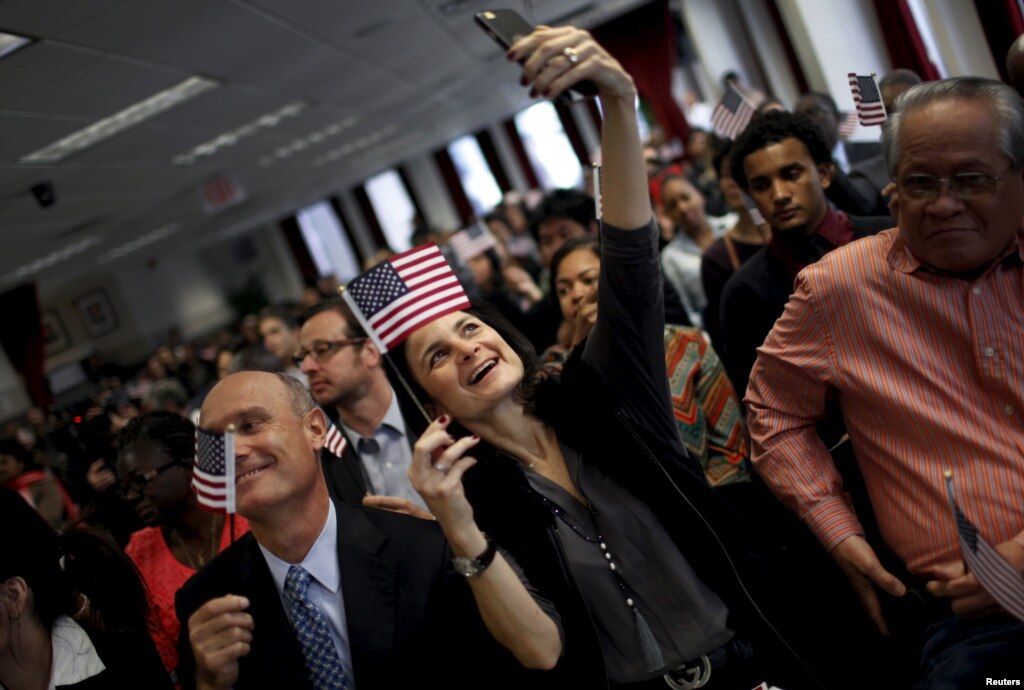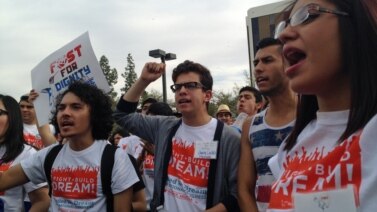
Between 1990 and 2000, immigration to the United States increased greatly.
The immigrant population increased by 11.3 million to 31.1 million in that decade, according to U.S. Census data.
Many children born to those immigrants are now or will be 18 – the age Americans are eligible to vote. Any child born in the United States is a U.S. citizens, even if their parent is not in the country legally. They can vote when they reach 18, according to the U.S. Constitution.
The effect of that wave of immigration in the United States is significant. For one, more immigrants will be able to vote in 2016 than previous U.S. presidential elections.
For another, how immigration policy will be shaped is central to the 2016 presidential race.
Front-running Republican presidential candidate Donald Trump has focused his campaign on harsh speeches about immigrants.
He proposes building a wall along the U.S.-Mexican border to keep illegal immigrants out. He proposes deporting the estimated 11 million undocumented immigrants, though he says he would allow many to return.
In 2013, close to 47 percent of immigrants (19.3 million) were naturalized U.S. citizens, according to the Migration Policy Institute. The remaining 53 percent (22.1 million) included legal permanent residents, unauthorized immigrants, and legal residents on temporary visas, such as students and temporary workers, the institute says.
Vincent Boudreau, dean of the Colin Powell School for Civic and Global Leadership at the City College of New York, says Trump has made immigration one of the major issues.
Says Boudreau: “In 2012, when American voters in New Hampshire and Iowa were asked about what issues are the most important to them, immigration didn’t make it to on their top five. And now it’s in the top three issues in those states, largely because Donald Trump insisted on putting it there.”
The immigration debate is fueled by fear of terrorism, as well. Tashfeen Malik, one of the suspects in the San Bernardino, California, mass shooting last week, entered the United States last year on a special visa for loved ones of U.S. citizens.
Malik entered the U.S. on a K-1 visa. It permits foreigners to travel to the United States and marry a U.S. citizen.
Malik and her husband, Syed Farook, are accused of killing 14 and injuring 21 at an education center. Farook was born in the United States. They were killed in a shootout with police after they fled the scene.
Some members of Congress say the San Bernardino shootings show that the visa program needs review. One of those asking for the review is Senator Ted Cruz of Texas, who ranks second to Trump among Republican presidential candidates in the latest CNN/ORC poll.
But the extreme talk about immigration could hurt Republicans in the general election, analysts say.
“Some of our community members may have stayed out of national politics,” says Steve McFarland, coordinator of the Long Island (New York) Civic Engagement Center. “But the tone of this debate has really galvanized a lot of Latinos.”
The Hispanic vote is credited with helping push Barack Obama to his second-term win in 2012 over Republican presidential candidate Mitt Romney.
Ramon Taylor reported on this story for VOANews.com. Bruce Alpert adapted this story for Learning English. Kathleen Struck was the editor.
Words in This Story
undocumented – adj. not having the official documents that are needed to enter, live in, or work in a country legally
eligible – adj. able to be chosen for something
significant – adj. large enough to be noticed or have an effect
harsh – adj. unpleasant and difficult to accept or experience
insist – v. to demand that something happen or that someone do something
crackdown – n. a serious attempt to punish people for doing something that is not allowed
galvanized – v. to cause people to become so excited or concerned about an issue or idea that they want to do something about it
We want to hear from you. Write to us in the Comments Section or share your views on our Facebook Page.


